When I tell people abroad that IŌĆÖm from ėŻ╠ę╩ėŲĄ, the first thing they often mention isnŌĆÖt baseball or the Gateway Arch. ItŌĆÖs plants.
From London to Durban, Bangkok to Panama City, people in scientific and policy circles recognize ėŻ╠ę╩ėŲĄ as a global leader in plant research. Our city is home to world-renowned institutions like the Missouri Botanical Garden, the Donald Danforth Plant Science Center and the Bayer Crop Science headquarters ŌĆö institutions whose research has a global impact on food security, human health and environmental resilience.
And yet, here at home, that legacy is surprisingly invisible. Friends in North City or neighbors in Chesterfield are often surprised when I tell them that ėŻ╠ę╩ėŲĄ is a world capital for plant science. It leaves me wondering: how can our kids imagine futures in a field theyŌĆÖve never heard of, especially one thatŌĆÖs growing in their own backyard?
People are also reading…
That question is part of what inspired my team to partner with the ėŻ╠ę╩ėŲĄ County Library system on a summer STEM (Science, Technology, Engineering, and Mathematics) challenge. We wanted to connect families with the science happening in their communities, especially in neighborhoods that donŌĆÖt always see themselves reflected in the science economy.
The idea was simple: Meet people where they are ŌĆö at trusted locations like public libraries ŌĆö offer hands-on science activities, and plant the seeds of possibility.
This year, though, that program wonŌĆÖt run because the funding that made it possible was eliminated. The National Science FoundationŌĆÖs Advancing Informal STEM Learning (AISL) program, which supported our work, is now one of many federal investments in science education facing a cut and early termination of our grant.
As someone whoŌĆÖs spent my career trying to build stronger connections between plant science and the public, this loss hits hard. As a mother raising three children in ėŻ╠ę╩ėŲĄ, it hits even harder. I know how important early exposure to STEM can be ŌĆö not just for individual kids, but for our regionŌĆÖs future workforce.
At the Danforth Center, our team used NSF AISL funding to build educational programs in public libraries to reach thousands of families, many of whom had never set foot in a science center, museum or lab.
These sessions didnŌĆÖt just teach families about plants; they connected STEM to everyday life and careers. These werenŌĆÖt just fun science demos. They were entry points into a growing field ŌĆö AgTech ŌĆö thatŌĆÖs critical to MissouriŌĆÖs economic future.
Agriculture already accounts for nearly 400,000 jobs and over $88 billion in annual economic impact in Missouri. But across the region, weŌĆÖre hearing the same thing from employers and innovation hubs like BioSTL and the Taylor Geospatial Institute: There arenŌĆÖt enough local workers with the skills to meet the demand.
If we want a strong pipeline of talent into this growing sector, we canŌĆÖt afford to cut science education ŌĆö especially not programs that are helping more communities access opportunities theyŌĆÖve previously had limited access to.
Losing programs like ours doesnŌĆÖt just mean fewer STEM opportunities this summer. It means fewer people entering science careers ten years from now. Fewer data scientists, fewer biotechnologists, fewer agricultural engineers. The kinds of jobs that power our local economy and help feed the world.
If weŌĆÖre serious about building a stronger, more resilient AgTech workforce, we need to invest in the entire pipeline. That starts not in the boardroom or at the research bench, but in our libraries, classrooms and afterschool programs.
Tell our officials in Washington to fund science research and education. These programs are not a luxury, they are the infrastructure that underpins our economy, our health, our environment, and our kidsŌĆÖ futures. The world already knows what ėŻ╠ę╩ėŲĄ has to offer. ItŌĆÖs time we made sure our kids do, too.
Dr. Callis-Duehl is the executive director of education research and outreach at the Donald Danforth Plant Science Center in Creve Coeur, a mother of three in the Rockwood School District, and serves on the boards of the Collegiate School of Medicine and Bioscience, the Academy of ScienceŌĆōėŻ╠ę╩ėŲĄ, and the Higher Education Consortium of Metropolitan ėŻ╠ę╩ėŲĄ to promote STEM education across the region and help fuel the future of our economy.













